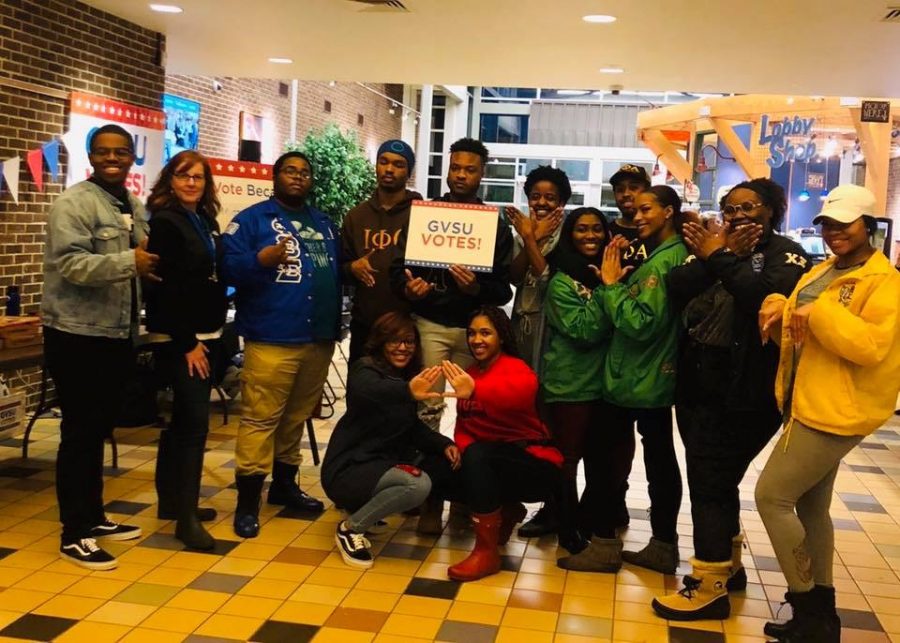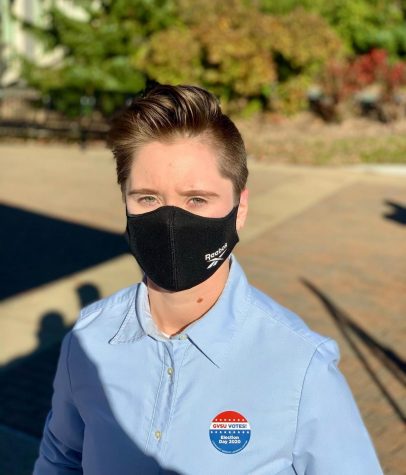GV Student Senate members join student voter engagement task force
Jan 20, 2020
Throughout the year, GVSU Student Senate members work on solutions and advocacy for issues and initiatives both on and off campus. This year, one of those initiatives is the Collegiate Student Voter Task Force (CSVTF), formed by Michigan Secretary of State Jocelyn Benson and her team. GVSU Student Senate President Eric-John Szczepaniak and fellow Senator William Thayer were appointed to the CSVTF by the Secretary and have been working on solutions to encourage civic engagement at GVSU and elsewhere.
The first of its kind, the nonpartisan task force seeks to improve voter engagement among young people and college students. It includes 32 students from 23 colleges, community colleges and universities throughout Michigan with hometowns across the state. President Eric-John Szczepaniak says that he joined the project to empower and educate others about voting.
“I have always been interested in empowering others to gain agency and ownership in their communities, and love to see others realize that they have vast potential to be a force for good and helping folks find their niche,” Szczepaniak said, “I applied for the CSATF because I wanted to be part of the solution and work toward overcoming barriers to civic engagement for young people.”
Historically, students in Michigan have faced significant barriers to voting and participated in elections at lower rates than other age groups. According to Michigan State University News, in 2016 the youth voter was at 43 percent. Michigan has been seen fluctuating voter numbers among college age voters since 2012.
The CSVTF’s report includes many different solutions for improving student voter engagement including bolstering voting education at the local, K-12, higher education and state government levels, creating new on campus resources like satellite clerk offices and on-campus polling locations, and absentee voting solutions.
GV’s Community Service Learning Center provides many student voter education resources like the Campus Democratic Engagement Coalition, a group founded by Student Senate in 2018 helps accomplish the CSLC’s work across campus, hosting the Mobile Secretary of State Unit to register students, and handing out voter guides across campus throughout the year. The CSLC works closely with GVSU Student Senate on many of their initiatives involving voter engagement, and focus on voter registration, education, turnout, and civility & dialogue as they work to educate among new and seasoned voters alike.
Last year, Student Senate asked the University to prohibit in-person examinations and assessments on election days so that students are not too heavily penalized if they need to skip a class to go vote. Additionally, Student Senate will soon consider a resolution asking for required syllabi language that details how to register to vote and upcoming election dates for students to keep in mind. Senator Thayer says that he continues to support this path, but also hopes to bring even more education to students through finding creative solutions.
“Student Senate is working to be able to reach students where they are, in order to ensure that they have the necessary information,” said, Thayer, “We are working on drafting information that can be easily accessible to all students, not just those that are already heavily involved with on-campus activities. Being a registered voter is so important for college students and everyone else because it is the first step toward engaging with our political system.”
Since 2016, GVSU has provided a robust Voter Vans system in November elections to get students to the polls in Allendale and Georgetown Townships. President Szczepaniak says that along with providing this system, he hopes GVSU will explore potential partnerships with ride-sharing companies like Lyft and Uber, who provide discounts created to help students get to the polls on election days.
Szczepaniak explained that simplifying the process for voters is an important part of the initiative, and that voting should be an easy to complete task. A top priority of the CSVTF’s recommendations is that plain language ballot summaries be created so that the voter can clearly understand what a local millage request is and what it will do to their taxes and to the collecting agency, as well as highlighting the need for pre-paid return postage on absentee ballots and the request forms. He hopes that initiatives like these will make a difference at GVSU and other universities around Michigan to help people learn the importance of their civic duties.
“Voting can be difficult. The process of democracy is very bureaucratic by nature and we need consolidated efforts to make sure that all eligible voters fully understand it and have full access to it,” Szczepaniak, “Our recommendations are not exhaustive and we hope that the University will continue with a long-term commitment to civic education and always work with student leaders to identify and mitigate issues that might prevent students from exercising their right to vote.”

























